The Day the Bookies Wept

Brief Synopsis
Cast & Crew
Leslie Goodwins
Joe Penner
Betty Grable
Richard Lane
Tom Kennedy
Thurston Hall
Film Details
Technical Specs

Synopsis
Tired of losing their earnings every week to the bookies, New York taxi drivers Firpo and Brophy decide to take matters into their own hands by buying their own horse. To purchase and train the beast, the duo nominate fellow taxi driver Ernest Ambrose because of his experience raising pigeons. When they fail to convince Ernest to go to Kentucky for them, Firpo and Brophy hire a man to dress like a gorilla and frighten Ernest into having an accident, which they know will result in his termination at the cab company. Once fired, Ernest leaves his beloved pigeons in the care of his sweetheart Ina and journeys to Kentucky to attend the horse auction. Knowing nothing of horses, Ernest is tricked by a phony "Kentucky Colonel" into purchasing a worthless nag named "Hiccup," out of Bourbon by Distillery. Ernest then returns to New York, where he and his horse bed down at the Jamaica racetrack. After "Hiccup" establishes a miserable record by finishing his first race just as the next race is about to start, the odds begin steadily to rise against the steed. As the cabbies become impatient to recoup their investment, the colonel arrives and sees that the horse is entered at sixty-to-one odds. Ina threatens to call off their wedding if Ernest fails to win the next race and retire from horseracing, and overhears the colonel talking about "Hiccup's" fondness for alcohol and his plans to intoxicate the horse. Before the race begins, the colonel sends a keg of beer to the stable and then bets heavily on the horse. When Ina arrives and finds the horse drunk, she decides against betting the two thousand dollars that the cabbies had pooled. However, on her way from the stables, she meets the colonel, who informs her of the horse's peculiarities. Ina then bets the entire pot, and when "Hiccup" wins by eight lengths, the day finally arrives when the bookies weep.

Director
Leslie Goodwins
Cast
Joe Penner
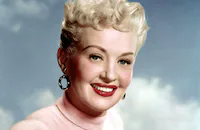
Betty Grable

Richard Lane
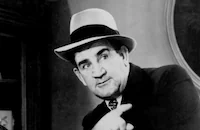
Tom Kennedy
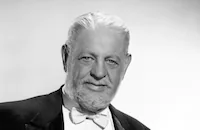
Thurston Hall
Bernadene Hayes
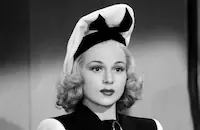
Carol Hughes
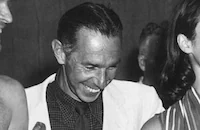
Jack Arnold
Teddy Manjean
Earl Hodgins
Billy Newell
Emory Parnell
Edward Earl
Max Wagner
Harry Bowen
Frank Marlowe
Eddie Borden
Ronnie Rondell
Crew
Doran Cox
Bert Granet
Feild Gray
George Jeske
Jack Mackenzie
Lee Marcus
Desmond Marquette
Arthur Morton
Van Nest Polglase
Renié
Harry Scott
Robert Sisk
Richard Van Hessen
Vernon L. Walker

Film Details
Technical Specs

Articles
The Day the Bookies Wept
The star of The Day the Bookies Wept (1939), a goofy but amusing "B" comedy, is Joe Penner. Little remembered today, the former vaudevillian was actually something of a craze in the early 1930s when he became a huge hit on the radio for his unsubtle but entertaining, simpering nasal delivery and his weekly warbling of novelty tunes. Such was Penner's popularity that he turned up as a guest character in several cartoons of the period and had his own wind-up toy. His first feature film was College Rhythm (1934), and he worked steadily through the decade. The Day the Bookies Wept was his eighth feature, most of them made at RKO. The Hungarian-born comic only completed two more pictures after this, including The Boys from Syracuse (1940), based on Shakespeare's The Comedy of Errors, before he died of heart failure in 1941 at the age of 36. In this film, he plays the pigeon enthusiast who finds himself training the alcoholic horse.
Despite Penner's broadcast popularity, most film reviewers found him distinctly unfunny and annoying on screen, but The Day the Bookies Wept caught them unawares about as much as the bookies are when Hiccup begins to win races. No less than New York Times critic Frank S. Nugent remarked: "Until today, the best we've ever said about Mr. Penner's comic talents was that they came to the square root of zero, extended to the fifth decimal point. Now we take it back. In The Day the Bookies Wept, at the Rialto yesterday, Mr. Penner is superb. Every time he opens his mouth, the script-writers put a good line into it. Or nearly every time: on the off-moments he relies on his adenoids, which are almost as funny."
Nugent also noted Hollywood's penchant for, and considerable success with, the horseracing/gambling genre, particularly those in the comic vein. Earlier, Paramount had good box office returns for Sing You Sinners (1938), starring Bing Crosby, Fred MacMurray, and Donald O'Connor, and Warner Bros. did well with Three Men on a Horse (1936) with Joan Blondell and Frank McHugh. And, of course, over at MGM, the Marx Brothers made a shambles of the track in A Day at the Races (1937).
The review also credited Tom Kennedy with almost stealing the show as one of the two cabbies. But a player Nugent didn't mention at all would go on to become one of the biggest stars of the 1940s. Betty Grable started in movies as an adolescent in the late 1920s and appeared in numerous shorts and bit parts by the middle 30s. She quickly became known for her dancing and her figure, exploited in a minor movie that would give her a major nickname for the rest of her career, Million Dollar Legs (1939). By the war years, she was one of Hollywood's biggest stars and the main Pin-Up Girl for soldiers overseas. There's no indication whether The Day the Bookies Wept inspired a certain quote by her, but Grable, who was married briefly to former silent-era child star Jackie Coogan and later married and divorced band leader Harry James, was reputed to have said, "You're better off betting on a horse than betting on a man. A horse may not be able to hold you tight, but he doesn't wanna wander from the stable at night."
According to a news item in the Hollywood Reporter prior to the release of The Day the Bookies Wept, chase scenes were filmed on location in downtown Los Angeles at Second and Hill streets. The script by Bert Granet and George Jeske was based on the short story "Crazy Over Pigeons" by Daniel Fuchs, published in Collier's on April 29, 1939.
The innocuous comedy had some trouble with the censors. A letter in the Motion Picture Academy archives shows that the Hayes Office warned RKO to eliminate all "razzberry" noises in the script and requested the removal of a bit where cabbie Brophy winks at Penner's character because of its "lewd connotation." In August 1939, shortly before the film's release, the censors also told RKO to cut the sequence showing a man observing Kennedy imitating a girl "and reacting as if he thought Kennedy was a 'pansy.'"
Actor Vinton Hayworth, Grable's uncle, appears in a small role in The Day the Bookies Wept. He started in films in 1934 and played in the London stage version of the racing comedy Three Men on a Horse. This was the only film he made with his niece.
Director: Leslie Goodwins
Producer: Robert Sisk (uncredited)
Screenplay: Bert Granet, George Jeske, based on the story "Crazy Over Pigeons" by Daniel Fuchs
Cinematography: Jack Mackenzie
Editing: Desmond Marquette
Art Direction: Van Nest Polglase
Original Music: Arthur Morton (uncredited)
Cast: Joe Penner (Ernie Ambrose), Betty Grable (Ina Firpo), Richard Lane (Ramsey Firpo), Tom Kennedy (Pinky Brophy), Thurston Hall (Colonel March).
BW-64m.
by Rob Nixon

The Day the Bookies Wept
Quotes
Trivia
Notes
According to a Hollywood Reporter pre-release news item, chase scenes were filmed on location in downtown Los Angeles at Second and Hill streets. Although a Hollywood Reporter news item listed Chill Wills in the cast, his appearance in the released film has not been confirmed. A letter contained in the MPAA/PCA Collection at the AMPAS Library indicates that the PCA warned RKO that "all 'razzberry' sounds throughout the script must be eliminated." The PCA also requested the removal of the action of "Brophy" winking at "Ernest" because of its "lewd connotation." Futhermore, in August 1939, the PCA informed RKO that it should eliminate the sequence showing a man watching Tom Kennedy mimicking a girl "and reacting as if he thought Kennedy was a 'pansy.'"














